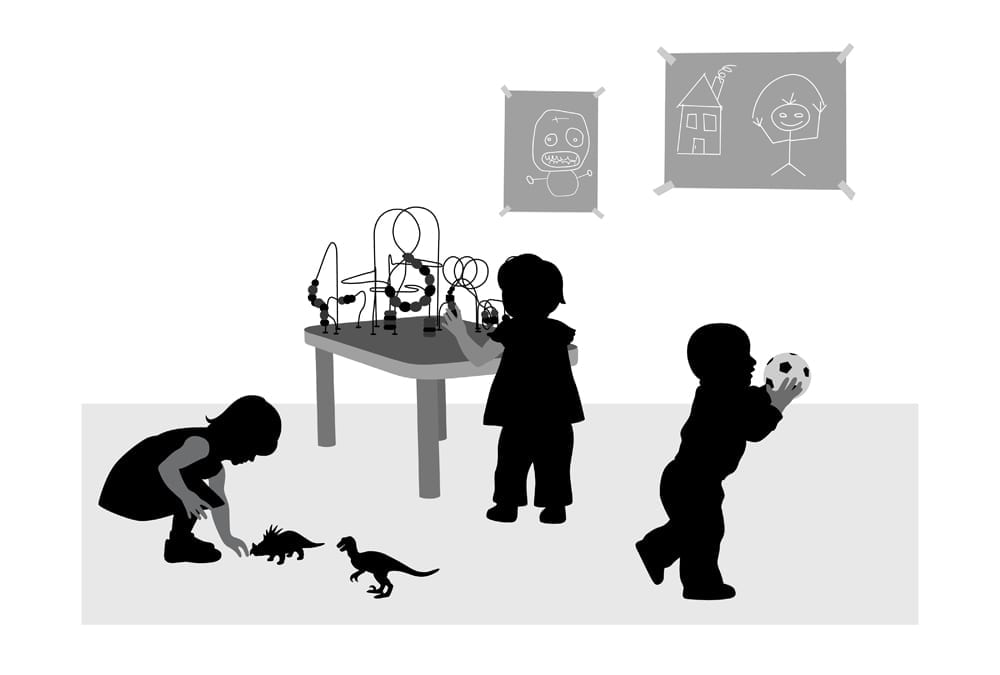 For too many working parents, summer is a nerve-wracking roller coaster of scattershot camps, vacations with relatives, and kids left alone for too long. We gratefully return our children to regular school in September. This nutty “break” is stressful for parents and kids — a far cry from idealized summers together at the pool, beach or backyard.
For too many working parents, summer is a nerve-wracking roller coaster of scattershot camps, vacations with relatives, and kids left alone for too long. We gratefully return our children to regular school in September. This nutty “break” is stressful for parents and kids — a far cry from idealized summers together at the pool, beach or backyard.
Unfortunately, for working moms with kids under age five, there is no “back to school.” Their children are stuck on ridiculously long daycare wait lists (some start before the baby is even born) or they simply cannot afford good daycare. Somehow, daycare has become a shameful concept in our society.
It’s time to change that, by eliminating the dirty phrase “daycare.”
The truth is that early education for children under age five – high quality, nurturing, educational care – is simply school for little kids. They may not learn algebra or the history of the Grand Canyon. But kids in a group setting, guided by skilled teachers and subject to constructive peer pressure, learn far more lasting skills: how to share toys, eat with a fork, go on a walk around the block or to the local park as part of a group, take a nap quietly in a room with six peers, to trust adults besides their parents.
These are all lessons that benefit children, their parents, and our society overall. Especially because study after study shows that children learn more in the first five years of life than the rest of life combined. So why is our society, and our government, so reluctant to support early education for our youngest citizens?
Part of the reason is pure ignorance and idealization of at-home motherhood, sometimes backed by cultural history, religious views, or a vague but stubborn belief that children are best cared for one-on-one by their mothers. Many people making laws that impact children under age five have never spent an hour, much less a summer or a year, caring for children under five. They simply do not know how valuable these early years can be, how boring and uneducational many household environments can be, and how constructive good childcare is. They write off or oppose government mandates that support “daycare” without understanding the reality of at-home vs. group childcare.
Additionally, our country collectively views daycare as a problem that individuals need to take care of themselves. In the New York Times “The Great Divide” segment, Alissa Quart explains:
“We see day care as a private responsibility. Part of the problem is that we sometimes have a problem with the idea of “day care” itself…[S]ociologists saw something I had seen as well among my middle class acquaintances: a discomfort with center-based day care and even the term “day care,” preferring terms like “educational enrichment” and, yes, preschool. Across the world, though, people count on the availability of day care and see it as a collective good: Americans don’t tend to do so as readily. More access to quality early childhood care would help. But those solutions go only part of the way. The most radical solution of all is the most obvious: we need high-quality, universal, subsidized day care. And we should not be ashamed to ask for it.”
No matter the justification, prejudice against daycare hurts our children – and working moms.
The first blow comes from how expensive daycare has become. The New York Times reports daycare can eat up 30 percent of one income in a two-salary couple. In 35 states and D.C., even the cost of daycare (let alone a nanny, which is usually far more expensive) is higher than the cost of a year of a public college. In New York, middle-class families can easily dish out $25,000 to $30,000 per child; low-income families cite childcare as their single greatest expense, costing more than either food or housing.
This is outrageous enough in its simple lack of fairness: only our wealthiest citizens can afford good early childhood education. But the hidden cost of childcare is even more destructive because of its gender bias: the expense derails women’s economic independence far more routinely than men’s, hurting moms and children over the long run. The cost of childcare causes many women – but few men – to “lean out” form their careers, to take years off from work at their earning peaks, to forfeit social security and pension contributions, and to quit work entirely.
Thus, defunding or non-funding of early childhood care programs is prejudicial towards children and towards mothers. It is gender and age discrimination, pure and simple. Time for a class action lawsuit – against our own government and society.
But come on, that’s crazy. Just as crazy as saying women and children have to start privately funding their own personal police force, firefighters, and roads. But is quality, affordable childcare any less critical than police, firemen, transportation or other community services?
Especially because there is an easy solution. Just as our communities and our country combine resources for “public goods” – sidewalks, public schools, and an army, that everyone benefits from but no single individual or group could justify paying for – we as a country should pool our resources to establish an affordable, high-quality, national childcare system so that young children can be safe and parents can work.
Everyone in the country, through taxes, would contribute a small amount towards a national childcare system. Everyone would benefit because more parents will be able to work, pay taxes, and contribute to our society. At the same time, children (our future citizens, tax payers, and leaders) will benefit from safe, stimulating care during their most formative years.
So let’s revamp our concept of daycare. It’s not warehousing of children or taking them from their mothers. Even the best of moms would agree that children crave the company of other children (hence playdates). There are many nurturing, stimulating upsides to kids coming together to play and learn from each other and from trained educators.
While we are at it, we need to eliminate the word “daycare.” Let’s call it Good Care. Or EduCare. Or anything that assuages people’s discomfort with the reality: that young children, their mothers, and our entire society benefit from structured, safe, stimulating, nurturing care long before prekindergarten.





